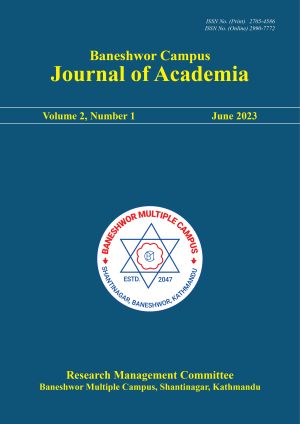Exploration of HIV/AIDS Risk Factors among FSWs in Hotspot Areas of Nepal
DOI:
https://doi.org/10.3126/bcja.v2i1.55764Keywords:
Risk factors, hotspot, sexual behaviour, cultural, HIV transmissionAbstract
Risk reduction of high risk group like FSWs (female sex workers) as bride population of HIV transmission from high risk group to low risk population still has been seen problematic in Nepal. This research paper explores the key socio-economic and cultural issues of HIV/AIDS risk factors among FSWs in hotspot areas of Nepal. A qualitative data were collected from the districts (hotspot areas) of Chitawan, Nawalparasi and Rupendehi. Altogether seven FSWs were recruited to interview and successfully completed the interviews. Narratives emerged from the FSWs to their HIV/AIDS issues in different contexts. Despite the decreasing trend of HIV/AIDS among FSWs in hotspot areas, the high risk behaviors of HIV/AIDS, poor negotiation or financial influence on sexual behaviour, alcohol drinking and unwanted sexual acts that put FSWs most at risk. The major reasons behind high risk behaviors are political, economic, legal, access to services and socio-cultural dimensions. The study indicates that it is necessary to develop and implement the HIV/AIDS initiatives among FSWs to address the risk factors HIV prevention from the cultural perspectives.
Downloads
Downloads
Published
How to Cite
Issue
Section
License
Copyright (c) 2023 RMC Baneshwor Multiple Campus

This work is licensed under a Creative Commons Attribution-NonCommercial 4.0 International License.
CC BY-NC: This license allows reusers to distribute, remix, adapt, and build upon the material in any medium or format for non-commercial purposes only, and only so long as attribution is given to the creator.





